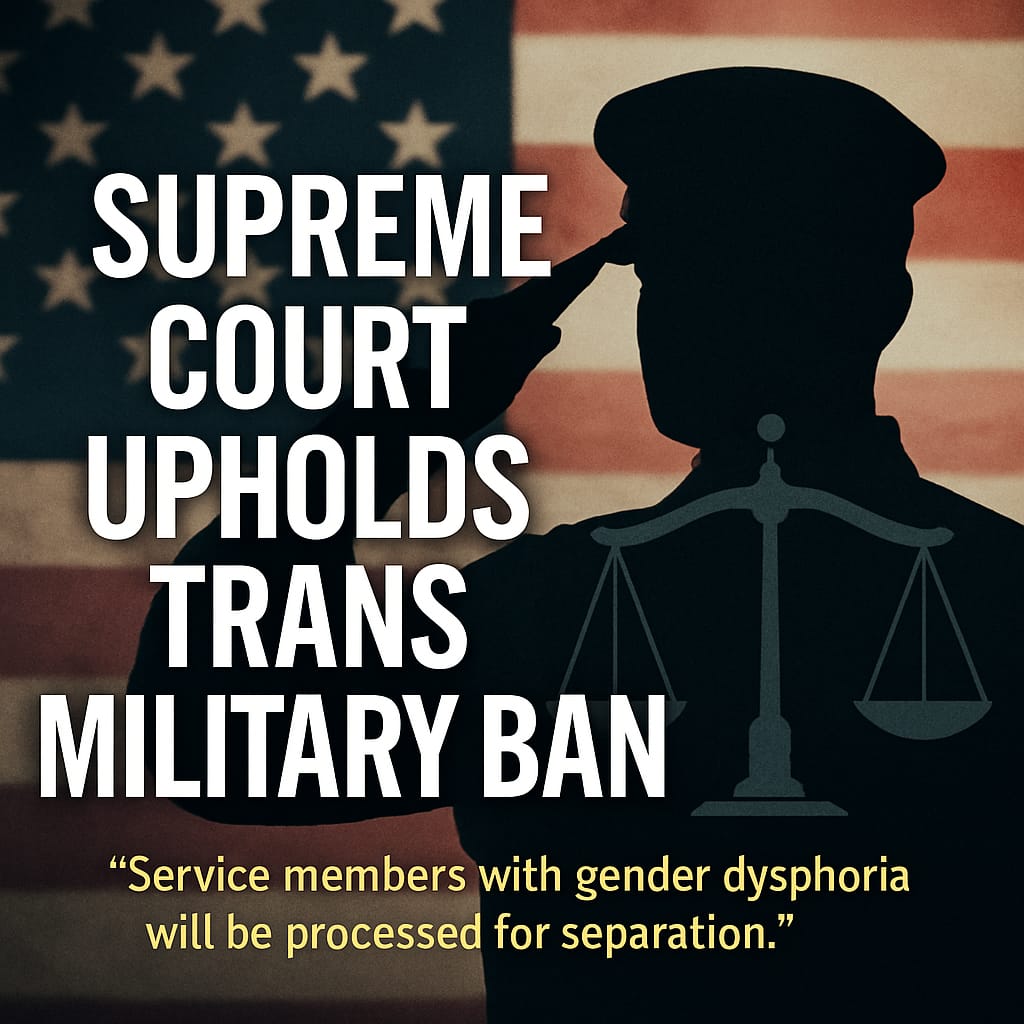
CNN — The Supreme Court said Tuesday that the Trump administration can begin immediately enforcing a ban on transgender service members in the military.
The decision is a major victory for President Donald Trump in his effort to get the high court to unlock various parts of his second-term agenda that have been held up by lower courts reviewing scores of legal challenges to his policies.
As is often the case in emergency rulings, the court did not explain its reasoning. The three liberal justices publicly dissented from the decision, but also did not explain their position.
During the president’s first term, the high court permitted Trump to enforce a similar – yet slightly more permissive – ban on trans service members. That prohibition was later reversed by President Joe Biden.
Under the new ban, “service members who have a current diagnosis or history of, or exhibit symptoms consistent with, gender dysphoria will be processed for separation from military service,” according to a memo outlining the policy.
The Pentagon will also not allow transgender Americans to join any branch of the military.
It’s unclear exactly how many transgender individuals serve in the military; in 2018, an independent research institute estimated there were 14,000 transgender troops serving.
A senior defense official previously told CNN there are 4,240 service members across active-duty, reserve and the National Guard with a diagnosis of gender dysphoria, defined as the psychological distress an individual feels when their gender identity differs from their gender at birth. But not every transgender individual has gender dysphoria.

Days after taking office in January, Trump signed an executive order directing the Pentagon to implement its own policies that say transgender service members are incompatible with military service. The government had argued that continuing to permit trans individuals to serve in the US would negatively affect, among other things, the military’s lethality, readiness and cohesion.
But federal judges reviewing legal challenges to the policy concluded that it violated the constitutional rights of transgender Americans.
In the case appealed to the justices on an emergency basis, US District Judge Benjamin Settle, sitting at a courthouse in Washington state, said the administration “fails to contend with the reality that transgender service members have served openly for at least four years under (policies from previous administrations) without any discernable harm to military readiness, cohesion, order, or discipline.”
“It provides no evidence to counter plaintiffs’ showing that open transgender service has in fact enhanced each of these interests,” the judge wrote, referring to the policy Biden had in place during his tenure.
But the administration argued that Settle had overstepped by wading into military policy. It asked the justices to put his ruling on hold for now after a federal appeals court in San Francisco refused to do just that.
“The district court’s injunction cannot be squared with the substantial deference that the Department’s professional military judgments are owed,” Solicitor General D. John Sauer wrote in court papers.
Without Supreme Court action, he added, the military will “be forced to maintain a policy that it has determined, in its professional judgment, to be contrary to military readiness and the Nation’s interests.”
But attorneys for the challengers in the case, US v. Shilling, urged the high court to stay out of the matter for now. They warned that a decision in favor of the administration would result in the immediate discharge of thousands of service members, “thereby ending distinguished careers and gouging holes in military units.”
“The loss of well-qualified servicemembers like (the ban’s challengers) will necessarily negatively impact military readiness, lethality, and unit cohesion – essential components of a strong and effective national defense,” they told the high court.
In another major challenge to the policy, the US DC Circuit Court of Appeals is considering whether to let a preliminary injunction issued by US District Judge Ana Reyes take effect for now.
The appeals court had put that ruling on a short-term hold while it considers the case.
Advertise with the mоѕt vіѕіtеd nеwѕ ѕіtе іn Antigua!
We offer fully customizable and flexible digital marketing packages.
Contact us at [email protected]
















Trump may look add, but great work he is doing in turning back battie boy domination of the world that was pushed by Obama, the onliest let down with trump is he scared of netanyahu and won’t cut him off from been a proxy of America in the middle east murdering people for no reason.
Good move … meanwhile we have a PM THAT USING HIS PLATFORM TO FIGHT FOR THEM .. when God created Adam and Eve he looked and said this Good … where did he go wrong ?… the world will be destroyed not by those who do evil, but by those who watch and do nothing…
ANR YOU ARE A DEVIL SUPPORTER….
Comments are closed.